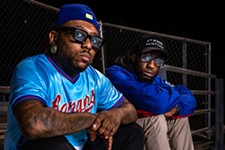Hate Eternal = Multitasking
Famed metal producer and frontman Erik Rutan can’t sit still
By Raoul Hernandez, 2:00PM, Fri. Nov. 20, 2015
Imbedded in every album press cycle for acts great and small comes blather of said LP being their finest platter to date. Seldom is that the case. Six full-lengths in, revered Floridian death metal trio Hate Eternal managed the mythical – an uncontested catalog peak via Infernus. Take your fire truck to the Dirty Dog Bar on Saturday to hear it live.

Austin Chronicle: You just released the best Hate Eternal album yet with Infernus.
Erik Rutan: Oh wow. Thank you very much.
AC: Artists say that all the time, “This is our best album.” Yet after hearing it, I went back over the Hate Eternal catalog and came away believing there’s no question this is the band’s finest album – sonically, compositionally, performance-wise.
ER: Thank you so much, man. You know, I usually tend to be more reserved about saying those types of words, because, like you say, most artists always feel like, “Ah man, our new record’s the best.” But in this case, man this album, we put so much work into it. We really worked hard to make the best record we could that covered a lot of territory. All the layers of dynamics and different tempos and variation of vibes – the production of the whole album. I think this is definitely one of our best as well, for sure.
AC: Does hard work only get you so far? In any creative endeavor do you need some kind of, I don’t know, fifth element to make it truly special?
ER: It’s a mixture of a lot of things. Some of it is just the chemistry amongst everybody involved. And also the willingness for people to lay everything on the line and give everything they have. Producing a record, the most challenging thing I can do is a Hate Eternal album. Someone asks me, “What are the hardest records you’ve done?” I’d say, “All the Hate Eternal records,” because I have so much responsibility between playing the guitars and singing, and then producing and mixing.
A lot of the magic that happens in the studio is really people’s willingness to lay it all on the table. Willing to compromise and everybody being on the same page. That really ends up giving the best results. One thing I learned a long time ago: albums are so important. They’re forever. I look at it that way. Every album I do in the studio is something that’s gonna be cemented in stone for my life and beyond my life. I look at every record that way in terms of importance. Every band that comes into my studio and records with me, I look at it as a special moment in time that’s gonna be captured.
In stone.
For eternity.
I look at everything I do in the studio with that kind of mass importance. Everybody that’s involved with the record, that’s their whole life right there. They put everything they have in it. I believe that in order to make the best record, everybody has to be willing to lay it on the table – everything they have. That means a lot of uncomfortable moments, a lot of trials and tribulations.
Like with Infernus. It was a long process – the writing, the pre-production, the recording, the mixing. When I was finally done with it, I knew at that point that I just gave everything I had. I had nothing else to give. I literally finished the mix and then the next day started a new production. To the last second, I gave everything I had to make that record be the best that it could be.
And at the end of the day, for a perfectionist like myself, I’ve learned over time that instead of always being overcritical of everything I do – which I’ve done my whole career and has helped me excel to be better – to just say, “Listen, I did everything I could to make the best record I could,” and accept that and move onto the next phase.
That’s something that’s really important as well. To give yourself, not a full pat on the back – “Awww, you’re the best” – but a little credit. If I give 110 percent on everything I do, which I do, then that helps the process of closing the chapter and moving onto the next one.
AC: You mentioned being in your 40s. I remember freaking out at that milestone, because I’d spent the entirety of my 30s working like a slave. Then I realized it could be the best decade of my life because I could suddenly employ all the knowledge and skills I’d accrued up to that point. I felt I was at the peak of my powers. Have you experienced anything like that?
ER: I’m very similar to you: In my 30s, man, I worked my tail off. I just did so much work. When I think of the last decade – I’m 44 now – I’ve just put in so much work. Somehow when I hit 30, I felt like, “Oh my god, I’m a full-fledged adult now,” even though I had been forever. But for some reason, 30 hit me hard in that way of, “Okay, now’s the time I really need to get my act together.”
I always feel like I should be doing more. That’s just how I am. And that’s why I’m a multitask, versatile kind of guy. I’m always doing multiple things. It’s just my personality.
When I hit 40, it was interesting because for the first time ever in my life, I was able to look at what I had done, and say, “Holy crap, I’ve been doing everything I ever dreamed of for over half my life now.” When I was a 15-year-old kid sitting in my bedroom playing guitar, trying to learn Slayer riffs and Iron Maiden, my dream was to create my own unique style of guitar playing and own a studio some day to record my own music and some of my friends’ bands – and tour the world and do records. When I hit 40, it was the first time I was able to reflect on my life. I feel like this is my time to really enjoy the fruits of labor.
I see everything clearer.
Now, when I look around me and see what I was able to establish with my studio, with my band, with my multiple careers – getting married – it makes you look back and say, “Well, all that hard work was worth every minute, and now it’s time to really enjoy all that hard work you’ve put in.” Being 40, honestly, it’s pretty awesome [laughs]. I don’t know if everyone says that, but for me, being 40 has really helped me in a lot of ways of being able to appreciate life and things around me.
Appreciate my friends and family, and appreciate the fact that come February of next year, 25 years ago I recorded my first album as a guitar player at 19. It’s still hard to imagine that for a quarter of a century, I’ve been able to do everything times 10 of what I always dreamed as a child. To be able to feel that and look back is a pretty incredible moment for me.
AC: The perfectionism and multitasking, where does that come from? Your parents, or ....?
ER: The perfectionism part definitely comes from part of my family. My estranged father, unfortunately, he was a very talented guy, smart guy. Played music. My father’s side was a lot of classically-trained artists. My sister plays classical piano. My dad played cello. My grandmother played classical piano. I played violin when I was a very small child. He was a perfectionist and his parents were perfectionists to a degree of unhealthiness. Yet for better or for worse, it instilled in me ....
For most of my life it was for worse, because everything was never good enough. As I’ve gotten older, I see that now in what my father portrayed. Not only that, but his father, and his father before him. And it was like – I don’t want to say genetic – this family thing that helped drive me to excel, but at the same time, it never allowed me to really appreciate everything I accomplished. If everything is never good enough, then you get in this rut, and I was in that rut for most of my life, where I just felt that no matter what I did it wasn’t good enough. That was passed down from my father and his father. It was definitely something that was unhealthy, but at the same time helped drive me to succeed.
And like I said, it wasn’t really until the last couple of years that I’ve been able to try and get a grasp on just being a healthier person mentally – physically, spiritually – and not letting some of these demons from my childhood completely consume me. You can get obsessed about these things, but at some point you just have to decide, “I’m not going to let these get the better of me.” By hitting my 40s, by being happily married, and by having a successful studio, a successful producing career, and playing music and touring the word and doing everything I always dreamed of, I’ve really been able to challenge that perfectionistic kind of trait in me and use it to my advantage.
Now, I handle it in a better way, of like, “Listen, nothing’s ever perfect.” As long as I do 110 percent; pardon my French, but I’ve never half-assed anything in my life. It’s just not in my personality.
The multitasking thing, sometimes I feel like a part of it is just because I think I have a little ADD. I’m all over the place. I’m just one of those guys that gets bored easy, so I always have to be doing something. For example, if I’m on tour, as soon as I wake up, I usually want to drive. Or do something. I wake, I’m full-on, like the Energizer bunny until the batteries die and I go to bed. I don’t nap. I’ve never been a napper.
I always think my life would be much simpler if I just did one thing, but I do multiple things and I’m already thinking five steps ahead on what’s the next thing I wanna do. It’s just always been that trait of being driven to excel at everything I do and be the best that I can. It makes me always do more and more.
I also realize that can be detrimental to your mental and physical state if you’re not careful, so I have to balance that all the time: my ambition and my will to succeed. Balance keeping my life together and not getting overextended. I’m one of those guys that’s like, “Oh yeah, I wanna do that, and I wanna do this,” and all of a sudden I’ve got 80 things on the table.

AC: You were saying before that an album lasts forever and needs to be taken seriously. We’re living in a pop age, the iTunes era, where people are buying albums less and less. And yet metalheads want both the physical product – such festishists – and the LP experience.
ER: A perfect example would be Infernus. We made five different colored vinyls. I sign vinyl every day. Every day I sign probably three to five vinyls that people buy at the merch table. We made these box sets that have a Digipak, a Hate Eternal flag with the cover, a patch, and a high-resolution audio download. All in this box set, and people buy that. They even made a cassette for this thing.
People buy the physical product in metal. I always go back to when I was kid and I would go to the record store. In New Jersey where I grew up, I used to go to Vintage Vinyl. “Hey, what records came in this week?” “Iron Maiden.” I found out about Iron Maiden because of the cover. I thought the cover looked cool. I was like, “Awesome.” I pop in it, “What the hell?” I’d never heard anything like that before in my life.
AC: Which album?
ER: The first Iron Maiden record, actually. The gift of being in yours 40s is that I was around during the beginning of metal. My uncle listened to Kiss, and Alice Cooper, Black Sabbath. That kinda opened my door a little bit and I bought Iron Maiden and Judas Priest, and then I was onto Metallica and Slayer. Then I just kept going, heavier.
As you can tell with our album cover, we spend a lot of time and money and effort in making our packaging and our covers. A lot of covers these days are like, “Ahhh, throw ’em together real quick with some digital manipulation.” I’ve always tried to have good paintings and really unique artistic approaches that match the artistic approach of the music. To me, the visual of metal and covers is still important to me personally, and I still think it is to our fans. I realize it from all the people that buy the physical product.
And luckily for me, Season in the Mist – our label – did a fantastic job with our new record. Multiple packages and so many unique [unintelligible]. At the same time, to go into the digital world, which is obviously common now, we did MFIT, which is “Mastered for iTunes.” That way our MP3s go into the future with more dynamic range, and we get a high-resolution audio version that you can download from HD tracks. We did like five different masterings just to have different versions for people that like various things in this day and age.
I do believe with metal – and metal being one of the few genres; there’s others that would probably fall in line – I do think people still like the physical product and they like to have a whole album. But we live in this ADD society, where everything is here today, gone tomorrow. When I was a kid, man, you bought a record and you listened to it for years. It never got old. Now, there’s so much physical product – and digital too – that everybody has a record. It’s harder to focus.
Back in the day, you didn’t have many options. You found something, you stuck to it like glue. You just listened to it over and over again. Funny thing is, I’m still kinda that way. I find something I like, I love repetition. I don’t know what that means. I’m still the same way, but I know things have changed a lot.
With a lot of other music, some people just buy a few songs. I still look at things in one way – as an album. With Infernus, from beginning to end, I think the album needs to be listened to in its entirety to really capture exactly what we were going for. From the song structures to the flow of the songs – the way they go into another – there was a lot of time meticulously spent to make that vibe happen.
Luckily for me, metal allows me to continue that path where other music doesn’t.
A note to readers: Bold and uncensored, The Austin Chronicle has been Austin’s independent news source for over 40 years, expressing the community’s political and environmental concerns and supporting its active cultural scene. Now more than ever, we need your support to continue supplying Austin with independent, free press. If real news is important to you, please consider making a donation of $5, $10 or whatever you can afford, to help keep our journalism on stands.
Michael Toland, Oct. 27, 2013
Richard Whittaker, Aug. 12, 2013
April 19, 2024
April 12, 2024
Hate Eternal, Erik Rutan, Iron Maiden, Slayer, Kiss, Alice Cooper, Black Sabbath, Judas Priest, Metallica










